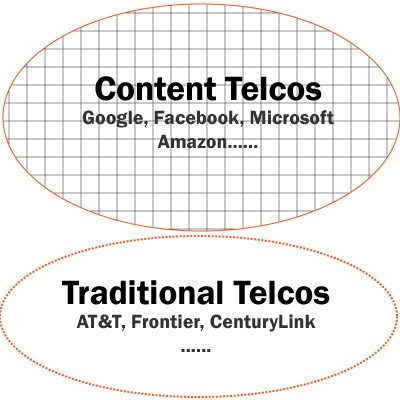Last week, Microsoft and Facebook announced they’re building a 4,000 mile transatlantic cable from Virginia Beach to Bilboa Spain. The venture is called MAREA and it will be operated by Telxius, a Telefonica infrastructure subsidiary. The undersea cable is billed as “the fastest cable ever to cross the Atlantic” which will consist of 8 fiber pairs with a capacity of 160Tbps, at least for starters. Of course, this project is one of many for the GAFAN+M (Google, Apple, Facebook, Amazon, Netflix, Microsoft) clan. GAFAN+M is investing like mad in submarine cable systems, dark fiber, satellites, balloons, wireless (MVNO), spectrum, broadband, and so on.
Are these Content Players who are investing billions in middle-mile and last-mile delivery infrastructure a Telco by definition? What is a Telco anyways? Is it LEC, CLEC, ILEC, or whatever, who owns facilities that extend to the home base and have a license from the government to sell services like voice, data, etc? Or is it an entity operating as an oligarchy which has a license to operate in a state, country or region with little or no competition? The brutal truth is the old definition of Telco is no longer relevant in the day and age of the cloud. The Google’s and WhatApp’s of the world have blurred the lines so much its hard to tell which is which.
Telco vs Content Telcos

In fact, there are two definitions of Telco 1) the traditional Telco like AT&T and CenturyLink and 2) the Content Telco like Google and Facebook, who offer Telco services running on open source software and bare-metal commodity hardware. Google, Microsoft and Facebook are not Telcos, but Content Telcos who are dismantling the traditional Telco institutions with free to low-cost Telco services.
Quiz Time: How is Google going to cripple Cable Operators and traditional Telcos in the US broadband market? If you guessed Google Fiber, you’re right. In a few short years, bank on Google Fiber introducing home broadband speeds of 100Gbps+. While Frontier, CenturyLink, Comcast, Time Warner, and others introduce their next generation single Gbps broadband solutions, Google will do the unthinkable and roll out 100Gbps to each home, because that’s what they do. In today’s world, innovations in broadband technology are no longer confined to the laws of physics, but to the imagination. Just look at the innovations in the Artificial Intelligence and Virtual Reality space and compare – broadband innovation can’t be more that much more difficult to develop than those in the AI and VR field.

